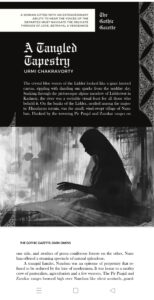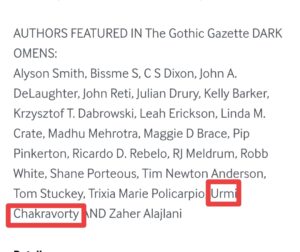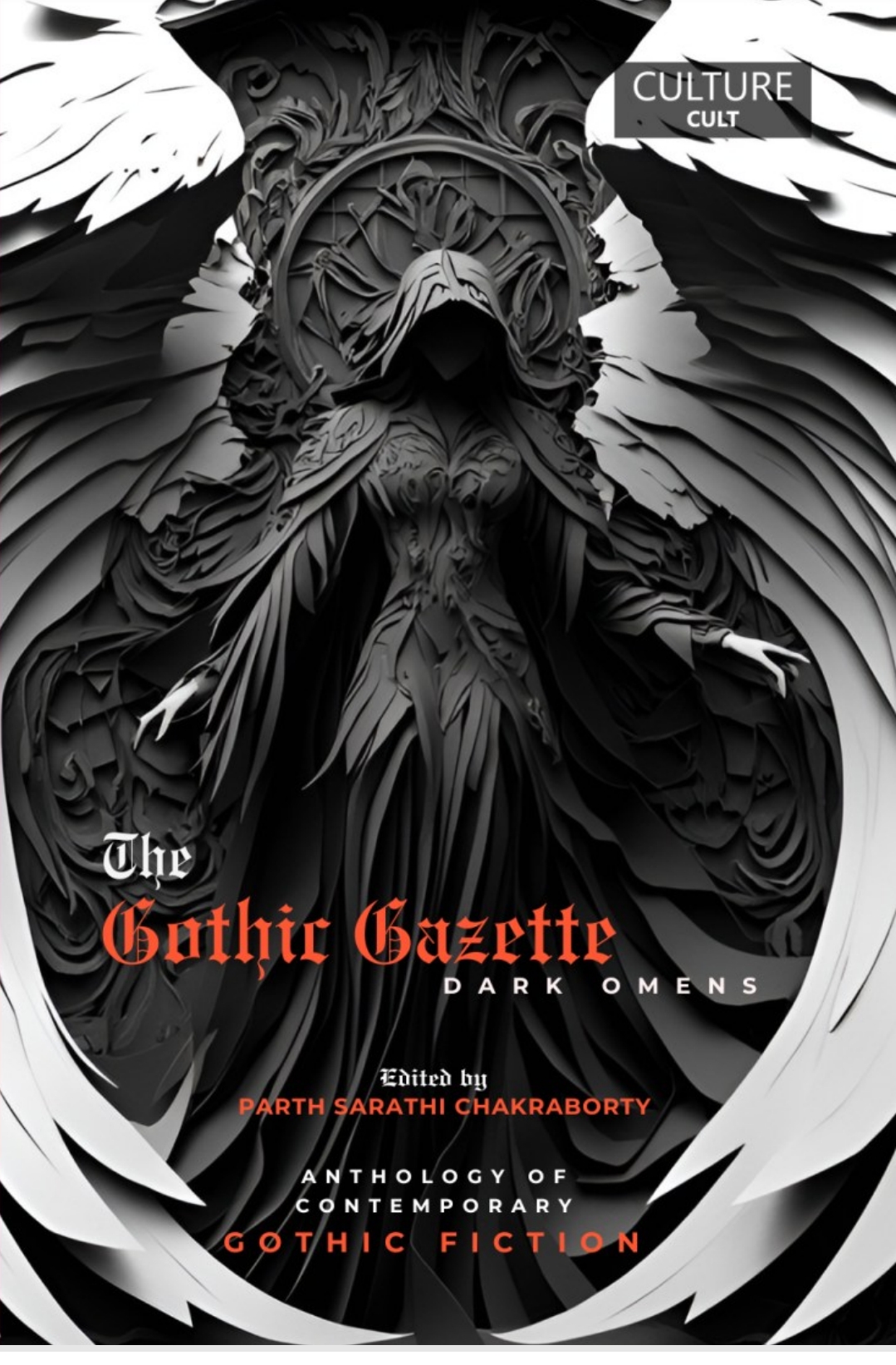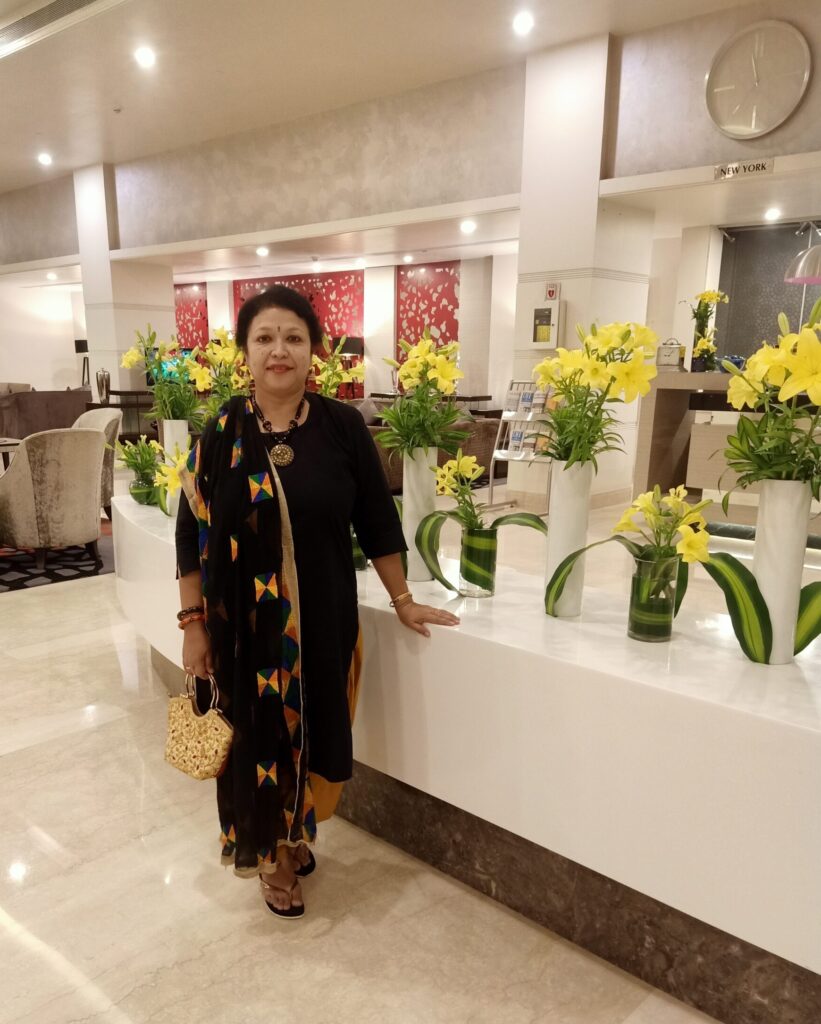This short story is a part of The Gothic Gazette, an international anthology of Gothic fiction published by Culture Cult publications in April 2025.


The crystal blue waters of the Lidder looked like a giant layered canvas, rippling with dazzling sun sparks from the midday sky. Snaking through the picturesque alpine meadow of Lidderwat in Kashmir, the river was a veritable visual feast for all those who beheld it. On the banks of the Lidder, nestled among the majestic Himalayan terrain, was the small, wind-swept village of Namban. Flanked by the towering Pir Panjal and Zanskar ranges on one side, and swathes of green coniferous forests on the other, Namban offered a stunning spectacle of natural splendour.
A tranquil hamlet, Namban was an epitome of perpetuity that refused to be seduced by the lure of modernism. It was home to a motley crew of pastoralists, agriculturists and a few weavers. The Pir Panjal and Zanskar ranges loomed high over Namban like silent sentinels, guarding the village substantially from the onslaught of hiemal winds and torrential rain. An assortment of occupations ensured a steady and sustainable income for the villagers, given the inhospitable climate they were forced to bear. This was one of those rare (and fortunate) places where transhumance had not become a necessity. A supply of livestock, along with the cultivation of crops like rice, wheat, barley, beans, oats, maize and tubers, provided these simple hill folks with all their essentials, and some luxuries, too
In the late twentieth century, Namban had acquired quite a reputation in both the domestic and international market because of its signature Cashmere wool. Both men and women were adept at knitting and weaving shawls, coats, ponchos, wall tapestry, rugs and carpets out of this prized material. When the weather outside made it impossible to grow crops, many of the villagers huddled around their kangri at home and pursued wool work. It took days…often, months…to complete a single piece of work. But the beauty and exclusivity of the finished products more than made up for the time and effort invested. International tourists often made a de tour to Namban, simply to watch the artisans at work, and sometimes, to purchase their wares, too.
At the northern fringe of the village, lived Afroza, a woman known for weaving the most exquisite carpets. Married to Ghufran, a strapping young animal herder when she was barely seventeen, Afroza was blessed with a beauty that could well make her a muse for umpteen poets. Set in a porcelain face, her grey-green eyes with their velvety eyelashes seemed to mirror the waters of the Lidder. The dense, wavy mane tumbling over her petite shoulders, hid a hundred secrets within their layers. The charm and freshness of her natural surroundings seemed to permeate her vibrant personality. Call it the headiness of youth or a beguiling innocence, Afroza made it a point to keep herself well-groomed and impeccably turned out at all times. Even when she stepped out in her loose, oversized kaftan, her comely figure swayed daintily, making the men delirious and their women, jealous.
However, in keeping with destiny’s quirk of balancing the good with the bad, and the happy with the bleak, Afroza failed to bear an offspring. Even after ten long years of marriage when she could not conceive, she reconciled herself to her fate of remaining childless for life. If Ghufran was disappointed, he did not show it. He valiantly defended his vulnerable wife, silencing naysayers with unmistakable firmness. Afroza, in turn, was grateful. She felt indebted to her husband and started considering him as her perennial repository of trust, and her strongest pillar of support.
To engage herself in some productive activity, Afroze plunged headlong into carpet weaving. Hailing from a family of reputed weavers, she was no newcomer to this art. She was a fast learner and diligent worker who had grown up watching her father and uncles toil away at the loom. A small room, more like an annexe, was built adjacent to their stone-and-mud hutment, where Ghufran helped set up her loom and the accompanying paraphernalia. The click-clack of the shaft and shuttle moving up and down…the soft, colourful yarn oozing warmth…the warp and weft of the wool interlacing and weaving a delicate pattern…these were elements she was familiar with. Her fingers danced across the loom with a grace that seemed sublime, creating intricate patterns of crimson, indigo, green and gold that shimmered with life. Each knot was a piece of her soul, a legacy handed down from generations of weavers in her family. Very soon, Afroze became the darling of fashionistas and art aficionados in her state. But shortly afterwards, something changed.
It began as a faint murmur, heard only at twilight. As the birds outside twittered and fluttered on their home-bound flight, Afroze would sit and work alone in her weaving room. The golden light of the setting sun filtered through the small window, casting long shadows on the walls. At first, she thought it was the wind playing tricks, whistling through the cracks in the stone walls. But then the voice grew clearer, more insistent, coming not from the air, but from the knots in the carpet themselves. She strained her eyes and ears to see more, hear better. It sounded like a grainy static that was struggling to be heard from an antiquated audio tape spool.
“Afroze…” the voice whispered, barely audible but undeniably there.
Her blood froze. It suddenly felt frigid inside the room and her palms turned cold and clammy. She looked around the room. There was no one – just her and the half-finished carpet before her. Shaking her head, she tried to dismiss it, but as she resumed work, the voice came again, clearer this time.
“Afroze, you must listen.”
The voice was low and gravelly but carried a weight that made her shiver. She fumbled with her needles until they dropped to the floor, her breath catching in her throat. Kneeling down, she pressed her ear close to the woven fabric, a strange pull drawing her closer. The knots in the blue and beige carpet seemed to light up with a red, smouldering glow.
“Who are you?” she whispered, her voice trembling.
“I am one who knows what lies beneath the surface, in the spaces between your knots, in the darkness where secrets fester,” the voice replied, its tone unsettling, like the rustling of dry leaves in the wind.
Afroze waited. She felt, at once, both panicky and piqued. If fear and confusion made her take a step back, there was this overwhelming urge to know more, and to delve deeper. There was this voice that was struggling to be heard, that was trying to reach out to her. How could she disregard it? Wasn’t it her mortal duty to lend it an ear?
“All right, so what is it that you seek of me?” It was a herculean task for Afroze to keep her voice steady, what with her heart thrumming audibly against her rib cage.
“In the adjacent village, there lives a woman named Saeeda.” The voice continued in a low, dispassionate tone, as if coming from light years away. “Her husband was a sheep herder. He fell into a gorge and lost his life three months ago. Saeeda and her three children are battling extreme penury. The man was already mired in debts. But foresighted that he was, he had stashed away a thick wad of cash, in case things really went south.”
The voice sounded exhausted, and paused momentarily, as if trying to get back its breath. After emitting some sputtering and crackling sounds, it continued, “Visit them tomorrow morning. Ask Saeeda to look for a battered iron trunk in the attic. The cash lies there, wrapped in a grey woollen muffler, buried under piles of frayed, moth-eaten clothes, waiting to be trashed.”
The droning voice stopped. Afroze waited, in case there was more to come. It didn’t. The cold draught suddenly turned warm and fuzzy, as a dazzling peach-and-mauve glow lit up the western sky. Afroze exhaled, deep and slow. A thousand questions swirled inside her brain until she thought it would explode. As a means to distract herself from this surreal episode, she meticulously started putting back the weaving material and the tools in their rightful places. As the loom fell silent for the day, Afroze deliberated on what just happened. This was not a figment of her imagination, nor any hallucination. She wondered, with some trepidation, why she had been entrusted with this crucial responsibility that could well save four lives from starvation and death.
The following morning Afroze set off in search of Saeeda in the neighbouring village. When Ghufran asked her about this sudden movement, she calmly replied she wanted to sample some newly-arrived stock of Cashmere wool in unusual shades.
‘But you could have purchased them from Rahim Chacha’s store. Why waste so much time and effort, walking down the narrow, uneven tracts?” Ghufran called out good-naturedly, foxed by his wife’s impulsive decision.
“Chacha doesn’t have them…I checked with him last week itself.”
The scene at Saeeda’s house was a mix of gloom and despair, which quickly turned into one of incredulity, delight, and immense relief. Afroze scrupulously followed the instructions given to her by the ‘Voice,’ as she called it. She had kept a few pre-meditated responses ready which helped quell Saeeda’s astonishment and adequately satisfy her barrage of questions. She was genuinely overwhelmed by gratitude, and couldn’t stop thanking Afroze for being the harbinger of their windfall and a messiah in their lives.
As Afroze trundled back home, she was convinced that she possessed a rare gift – the gift of building a bridge between the denizens of this world and those of the other. She was blessed with a unique sensory faculty that enabled her to hear voices from the ‘other side’ through the knots she so lovingly wove. She wasn’t sure if she should feel exalted or condemned.
The next few weeks rolled on uneventfully. Afroze’s reputation as a weaver soared even higher. She made the most of the warm summer months to get her yarn weave-ready. Ghufran assisted her in sorting, washing and layering the strands of the yarn to make them clean and tangle-free. Next, she dipped them in large burnt earthen pots filled with natural dye in vibrant shades. Sharing these activities with her husband made Afroze completely forget the apprehension and dilemma she felt during her ‘otherworldly’ experience. The snow-kissed peaks at a distance, the green meadows dotted with luxuriant deodar trees and patches of colourful wildflowers looked like a hill-view suite in paradise itself! They giggled and pranced around like teenagers, giddy in love, much to the envy of their neighbours. As the young couple laid out thick, long braids of lustrous wool on the grassy plot outside their house, the entire hillside seemed to come alive with their infectious synergy and the brilliance of the yarn.
One particular evening, Afroze was engrossed in passing the weft strings under and over the warp strings. It was a prestigious order in shades of brown, yellow and cream from a wealthy merchant, and she left no stone unturned to craft a collector’s item, interspersing the weave with her signature hand-made Persian knots. As she leaned in to examine a particularly intricate knot, she heard it again. It was unmistakably a ‘Voice’ – this time, robust and masculine – emerging from the half-made design, now lit up with a ruddy glow.
“Afroze…”
Afroze stopped work. She had almost dismissed the previous episode as a one-time freak incident – one of those many instances which are beyond the realm of human understanding and rationale. But here it was again, loud and clear, carrying a message from the other side.
“Afroze, I am Nabi and I need your help. I reach out to you from under layers of gleaming white snow on the Pir Panjal. I am a mountaineer hailing from Budgam …or should I say I was?” Here, Nabi gave a small, wry laugh. “The craggy mountains were always my safe spot — higher the altitude, greater was the adrenaline rush! Challenging the limits of human endurance gave me a kick. With every expedition completed successfully, I raised my own bar higher.” Afroze could feel a sense of confidence and pride dripping from his words. “My wedding is scheduled next week. This was my last high-risk trek before I settled down for the less perilous ones. But life (or was it death?) threw a curveball at me. I fell in the path of a deadly blizzard and here I am, communicating with you!”
In spite of herself, Afroze felt a knot in her heart. “It’s been three days and my family still doesn’t know. They’re used to my long silences and disappearances when I’m on my difficult treks.” the Voice continued. “In fact, they’re all busy with the wedding preparations. I know it will be tough on you but kindly convey to them the news of my passing. The longer it takes to reach, the harder it will be for them to accept it.” The final words were stripped of the initial machismo. It was more like a lament.
With some difficulty, Afroze gulped the lump in her throat. Though she tried her best to distance herself from the situation, the delicate humane core within her was invariably impacted by this spectre of death and sorrow.
The village of Budgam was some distance away and she didn’t want to miss the morning bus. Fortunately for her, this time she did not have to think of excuses for her trip as Ghufran was away to fix a business deal in faraway Srinagar.
Hadn’t Ghufran visited Srinagar just last month for work? Or was it Rajouri then?
The thought flitted across Afroze’s mind and disappeared as quickly as it had surfaced.
As she approached the address given by Nabi, energetic strains of lola bariyo dilbaro floated in. Women were seen twirling and dancing under the marquee in richly embroidered, multi-hued pherans. Their heavy, silver haseeri and hamel, along with embellished caps and jutti, completed their festive look. The air was fragrant with the scent of saffron-flavoured delicacies.
With a leaden heart, Afroze fulfilled her responsibility of being the accidental messenger. And in doing so, she unwittingly became the agent of a life-changing milestone in their lives. She briskly retraced her steps, trying to shut out the agonising wails of Nabi’s kin that rent the languorous afternoon air. While she was satisfied to have executed the given task well, she felt weighed down by the intense emotions it entailed. Emotions that threatened to seek permanent refuge in her fragile heart. She missed Ghufran immensely. She wanted to bury her head against his chest and lose herself within the cocoon of his strong, dependable arms. But Ghufran was away. And in any case, she had instinctively understood that this was a secret she could not share with anybody – not even with Ghufran.
Over the next two years, the callings became a regular feature. Seasons changed – the alluring greens, pinks and azures of summer burst out in a blitzkrieg of amber, russet, peach and gold with the onset of fall. The walkways became a crunchy carpet of the fallen chinar leaves. As winter set in, the waters of the Lidder froze and sharp icicles, more like crystal daggers, hung from ledges and rooftops. Sharp glacial winds drove people indoors, while Afroze amped up her weaving regimen. She kept a bulk stock of raw material ready, in case the weather turned unduly hostile and thwarted all outdoor movements.
The ‘Voice’ returned at least once in two months – each time clearer, each time revealing small fragments of reality and whispers of truth hidden from the world. Sometimes it was about important documents hidden somewhere, sometimes a confession about an illicit alliance, a warning for the ripened crops, or a healing message to a young mother grieving her departed child. They made Afroze ponder upon the fragility of life, the impermanence of relationships, and the evanescent nature of happiness. In the past few months, she seemed to develop a wisdom beyond her years. No longer was she the gullible, happy-go-lucky young maiden who believed that stars could be plucked by lovers or that, love made the world go round. With each visitation of the Voice, Afroze added a new chapter to her inner journal of experiences and life lessons.
The Voice never explained why it had chosen her but Afroze felt an eerie connection to it, as the knots of her rugs seemed to come alive with purpose. It was a conduit that offered her glimpses into the loves and lives of the departed. She saw, heard and sensed things that no one else could even imagine of doing. She appeased her disquiet and dilemma by convincing herself that the universe had blessed her with the power to liberate tormented souls, free them of unfulfilled obligations, and ensure their easy passage to the other side. Every human being was sent to the earth with a purpose – this was hers!
However, in all of this, Afroze felt something missing. It was the company of Ghufran. And the juvenile fun and banter they indulged in earlier. Their shared weaving activities, their inane jokes, the days of endless laughter ringing through the valley, or the nights of smouldering passion that often left her breathless! His father had passed recently, and he often visited his mother and brothers in the neighbouring village to help with the herding or farm work. On such occasions, he stayed away for a couple of days and nights. At home, he often looked distracted, and was forever busy making telephone calls. In fact, he appeared unfazed by Afroze’s occasional jaunts outdoors, when she had to ‘deliver’ the messages received from the Voice. If earlier he was overly concerned and curious, now he dismissed it as routine. If ever Afroze complained, he would gather her in his robust arms, work up his irresistible charm and say, “But isn’t this all for our better life, darling? So we grow old together, and sitting on walnut-wood couches in our spacious verandah, watch the sun go down behind the mighty chinar?”
Ghufran had often shared his dream of building a large house for the two of them, close to the meandering river, with a thriving apple orchard. He would thus become a proud trader and give up petty farming and animal husbandry altogether. On her part, Afroze never missed an opportunity to remind him of her plans to expand her weaving business. What started as a hobby or a passion had now become her raison d‘etre. The hallowed knots of her tapestry, surprisingly, helped untangle the ones that were mildly stressing her out in real life. Her special sensitivity to the words of the dead, as manifest through the knots, bolstered her self-worth, which had taken a beating due to her childlessness. Her craft gave her a reason to be proud of herself and her creativity, and also allowed her to forge a bond with fellow weavers and influential patrons.
One late wintry night, Afroze was working some intricate knots with her nimble fingers when the yarn turned ruddy. The Voice returned. She was taken aback. Had twilight been replaced by the traditional witching hour, she wondered, half amused. Over time, she had managed to tide over all her misgivings and fear associated with these episodes. They had become a part of her life, and with a rare insight and maturity, she learnt to distance herself from the emotional residue they left behind.
But this time the Voice sounded different. Heavy and grave. It carried echoes of a secret so dark and venomous that Afroze was shaken to her core. She wasn’t sure what to expect. With bated breath she waited for it to begin.
“It is about Ghufran, your husband,” the Voice said, its tone sharper than usual.
Afroze’s ears perked up…her hands stilled.
“What about him,” she asked, her voice thin.
The Voice spoke again, slow and deliberate.
“He has betrayed you. His heart belongs to another. His body, too. She comes to him in the thick of night while you sleep. He also visits her on the pretext of meeting his mother, and lies with her in the orchard outside the village under the pomegranate tree.”
Afroze’s world tilted. Ghufran did appear distant and somewhat disconnected, of late, but she had never doubted his loyalty. She always attributed it to his hard work, his future aspirations and the resultant fatigue. Or perhaps, the financial ramifications of it all. The Voice, however, did not waver. It spoke with a certainty that chilled her to the bone, and as much as she wanted to dismiss it, something within her stirred — a deep, gnawing suspicion that had long lain buried.
The next few days were a living nightmare for Afroze. She could not focus on anything at home. She was tempted to disbelieve what she heard. But soon realised the futility of living in denial. The words of the Voice broke the bubble of her happy marriage as she stared into an abyss of uncertainty and betrayal. She recalled all their silliness and shenanigans of the past decade, their silent moments of easy companionship, their dream of walking into life’s sunset hand in hand, and her eyes smarted.
Following the Voice’s instructions, she started watching Ghufran closely, noting his preoccupied look, his half-hearted responses, the small, subtle shifts in his demeanour, and his sudden disappearances, apparently to his family home. Now it all seemed to fall in place. Afroze cursed herself for being so gullible…for being taken for a ride.
One night, when Ghufran thought she was asleep and silently moved out of the house, Afroze followed him through the village, her bare feet silent on the cold earth. Just as the Voice had described, he met her — a charming woman from the neighbouring village, younger, with eyes that sparkled in the moonlight. Ghufran held her lovingly by her sylph-like waist and caressed her flowing tresses. His dark eyes flashed, wild desire swirling in them. They embraced under the pomegranate tree, their shadows merging into one. Afroze watched from a distance under the cover of darkness, her heart shattering, but her brain already calculating, already plotting.
When she returned to her loom the next day, the Voice greeted her.
“So now that you have seen the truth, what will you do with it?”
Afroze’s hands moved swiftly across the loom, knotting the threads with a savage brusqueness.
“I shall make them pay.”
The repugnance and resolve in her voice surprised Afroze. She had no road map laid out before her and yet, she was certain of her lust for revenge. It was simply an embryo of a plan, flailing about in the placental waters of her mind.
The Voice hummed with approval. “Good. We can help each other, you and I.”
From that moment on, her weaving took on a new intensity. She spent days, sometimes nights, in the dim light of her room, weaving a new carpet. This one was special, and unlike any she had made before. The patterns were dark, dense and chaotic, twisting and turning in ways that seemed almost unnatural. The colours were deep rich reds and blacks, interwoven with strands of silver that shimmered ominously in the light.
The Voice guided her, whispering instructions as she knotted the threads. “Each knot binds them to their fate,” it said. “Every twist and turn will lead them to destruction.”
It took some time for Ghufran to notice Afroze’s sudden vice-like obsession with her work. She had always been invested in her craft. Her eyes shone happily when she worked at her loom, with a satisfied smile teasing her dainty lips. But what had come over her now? Gone was the picture of wholesome contentment. Afroze wove like a woman possessed, barely looking up or speaking or even moving out for a breath of fresh air.
He tried to leaven the situation with his signature humour and well-intended ribbing. Afroze pretended not to hear.
Once she completed weaving the carpet, she looked at in admiration. It, indeed, was a masterpiece! Word spread fast and the villagers thronged to take a look at this piece of beauty. They were stunned by its detailing…they marvelled at its precision and finesse…but none could have guessed the darkness that seeped into every fibre of this fabric. Afroze presented it to her husband as a gift, knowing he would gloat in the aesthetics and artistry of his trophy wife! Ghufran was genuinely elated, and thanked her profusely.
Night fell. Pinpricks of starlight spangled the clear moon-lit sky. Around midnight, Ghufran tiptoed out of the house for yet another rendezvous with his lover. Looking dapper in a new sadri woven by his wife, he walked briskly until he reached the orchard. As the two met under their prized pomegranate tree, Afroze sat alone at home, her fingers brushing against the soft fibres of the carpet she had gifted Ghufran. In course of her other-worldly journey these past few years, she had trodden paths where the universe pulsed with untamed rhythms; where the ancient winds howled through forgotten forests; where the earth’s womb echoed tales of fear and doubt. But never had she felt such acute anguish as she did now. She closed her eyes, rocking back and forth, listening to the faint murmur of voices from the knots that blazed crimson today.
Far away in the orchard, a sudden gust of wind swept through the trees. The surroundings turned nebulous as lightning forked the skies. Bats flitted about in the darkness. The branches of the pomegranate tree creaked and heaved. The air grew heavy with an otherworldly presence. Ghufran and the woman felt it, too — a sharp chill and an unnatural scarlet haze all around, as the winds moaned and wailed. And then, without warning, the ground beneath them seemed to shift, the earth splitting open with a low, tectonic growl. Neither knew what was happening or why. They both dashed into the blinding mist, vanishing in the dense fog as the world around dissolved in chaos.
Afroze smiled as she heard their distant, desperate screams. The Voice had kept its promise.
When the villagers found them the next morning, their bodies were twisted, broken, and lying in an ungainly heap beneath the pomegranate tree. No one could explain this unprecedented event, but they all spoke in hushed tones about curses and dark magic. About how the mountains of Namban protected the pure souls and punished the vile. And how the Lidder curiously looked more voluminous, washing away the sins, as it were, of two corrupt souls.
Afroze never revealed the truth. She returned to her loom, her hands steady…her heart cold and empty…the whispers of the knots, her only company.
Glossary
Kangri – a small pot filled with charcoal used for warmth in Kashmir
Kaftan – a long loose tunic worn by Kashmiri women
Lola bariyo dilbaro – a popular folk song sung during weddings in Kashmir
Pheran – warm, loose, embroidered, knee-length robe worn by both men and women in Kashmir
Haseeri, hamel – traditional silver jewellery for Kashmiri women
Jutti – embellished traditional footwear
Sadri – traditional formal waistcoat worn by Kashmiri men
*********









